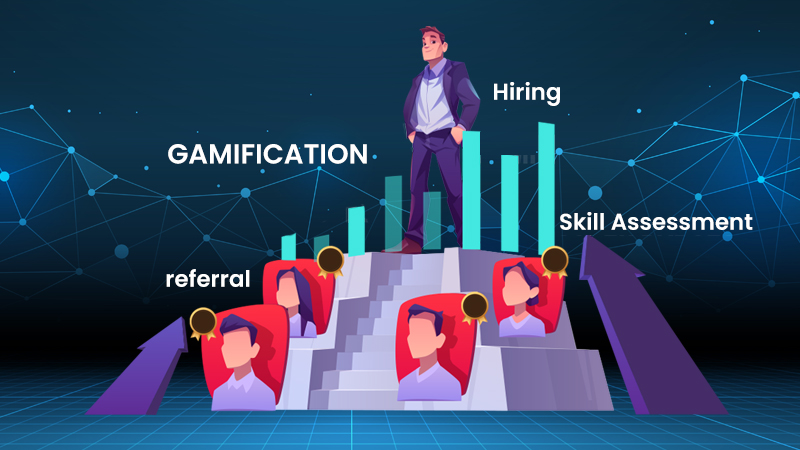Gamification is the use of game design elements and mechanics in non-game contexts to increase engagement, motivation, and participation. Gamification has found applications in different sectors such as education, marketing, and customer service, and now it is hoisting its flag in recruitment.
The Danish Company, Uncle Grey used Team Fortress players to get applicants for their front-end developer role. They provided sponsorship to the game’s leading players, who then displayed Uncle Grey’s job advertisements in the game and adopted the job URL as their in-game name. The response generated a large pool of qualified candidates, ultimately resulting in the successful recruitment of their front-end developer.
International advertising agency, Ogilvy & Mather createda social media competition to recruit their sales person. The campaign promised a fellowship at Ogilvy if they can sell a block of brick. This challenge not only found their eligible candidates but also tremendously increased their brand visibility globally.
Phoenix Software used escape rooms to recruit their candidates. They had to apply their technical skills to figure out the clues of the game. This not only tested the candidates’ technical ability but also their performance under pressure and their ability to coordinate as a team.
These are some of the examples showing how gamification can engage your potential employees and enliven your recruitment process.
How to use gamification in hiring?
Skill Assessments
One way to use gamification in hiring is to create skill assessments that use game-like mechanics. For example, instead of a typical multiple-choice test, a company can create an interactive game that tests the candidate’s skills. This not only makes the assessment process more engaging for the candidate but also provides a more accurate picture of their skills and abilities.
Simulation-Based Exercises
Another way gamification can be used in hiring is through simulation-based exercises. For example, a company can create a virtual simulation of a job task or scenario, and have candidates play through it. This allows the company to observe how the candidate performs in a realistic work situation, giving them a more accurate idea of their skills and how they would perform on the job.
Virtual Reality
Virtual reality is another gamification tool that can be used in hiring. Companies can create virtual reality experiences that allow candidates to explore the company’s workplace, culture, and values. This can give candidates a better sense of what it would be like to work for the company, which can help them decide if the company is a good fit for them.
Gamified Application Process
The application process itself can be gamified to make it more engaging and interactive for candidates. For example, a company can create a mini-game that candidates must complete as part of the application process. This not only makes the process more engaging for the candidate but also helps the company identify candidates who are willing to put in extra effort to apply for the job.
Employee Referral Programs
Gamification can also be used to encourage employee referrals. For example, a company can create a game that rewards employees for referring qualified candidates. This not only incentivizes employees to refer candidates but also makes the referral process more engaging and fun.
Benefits of Gamification in Hiring
Better Analysis
Traditional interview settings can often limit candidates from showcasing their full potential. Gamification on the other hand, offers an accurate assessment of a candidate’s strengths and weaknesses which may not be apparent through standard interview questions alone.
This approach also enables the identification of non-tangible qualities, such as emotional intelligence, common sense, vigilance, adaptability and coordination.
More Accuracy
Artificial Intelligence is the base of gamification and hence it provides better results in terms of accuracy. There is not much intervention by humans in the process and hence it provides a fair and unbiased evaluation.
Improves Candidate Experience
The spontaneity of gamification in the recruitment process, creates a more enjoyable and less stressful experience for candidates. This allows them to relax and approach the hiring process with more confidence and focus.
Increased Brand Awareness
Even if a candidate does not make it through the gamification process, the high level of engagement can still leave a positive impression and increase their eagerness to participate in future recruitment efforts. Furthermore, their experience may encourage them to spread the word about the company’s recruitment process to a wider audience.
Challenges Involved
Authenticity
Although gamification can be an effective way to evaluate a candidate’s abilities, it may not always provide a straightforward assessment. Due to the lack of direct interaction and the difficulty in confirming the authenticity of the candidate’s performance, it may be necessary to conduct additional in-person interviews before making a final hiring decision.
Cost
Creating gamified hiring experiences can be expensive, especially if a company is using virtual reality or other advanced technologies.
Accessibility
Not all candidates may have access to the necessary technology or equipment to participate in gamified hiring experiences.
Fairness
Companies need to ensure that gamified hiring experiences are fair and accessible to all candidates, regardless of their gaming skills or experience.
Data Privacy
Gamification can involve collecting and storing sensitive candidate data, which can create privacy concerns.
